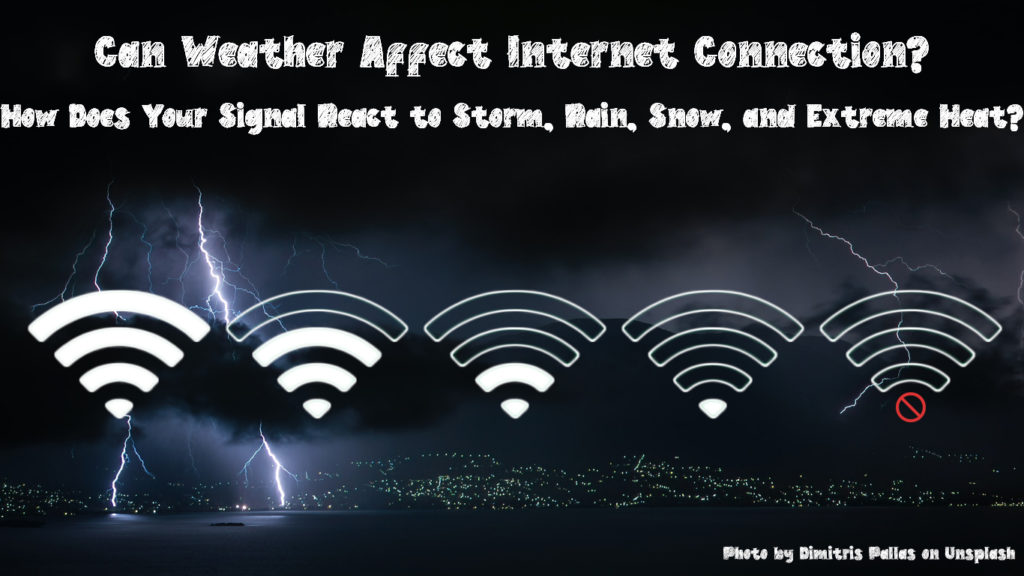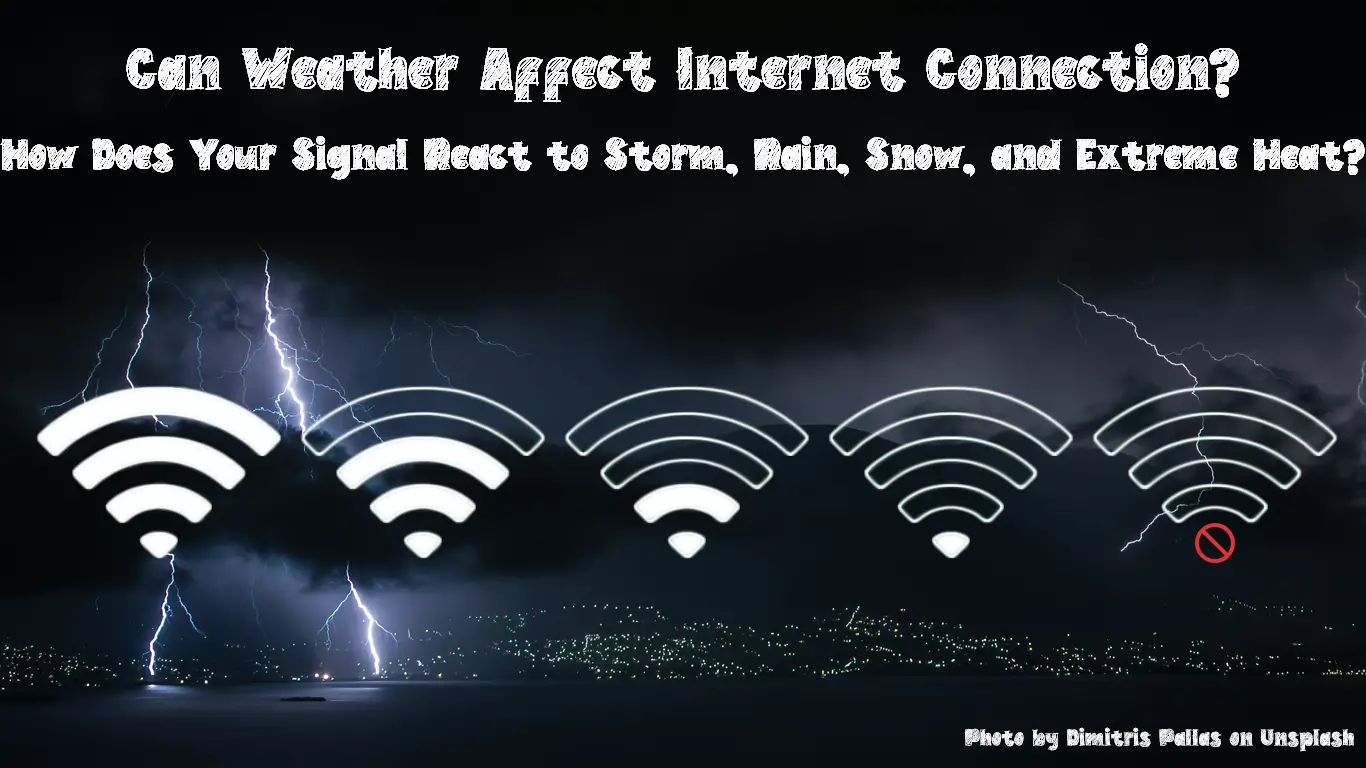A lot of internet providers promise a stable connection regardless of the weather conditions. But, is that an empty promise? Does the weather have an effect on the internet connection and is it really possible to prevent that from happening? You’ll get all the answers today!

CONTENTS
How Often Does the Weather Affect the Internet Connection?
In general, your internet connection should be stable during common weather changes regardless of the internet provider you choose. Still, a storm and heavy rain can affect the internet service of your internet company, which, in turn, weakens the connection your network relies on.
In addition, extreme weather conditions tend to influence the strength of your internet as well. Therefore, weather can affect your internet connection especially if the area where you leave is prone to extreme weather.
Moreover, different types of internet react differently to weather issues. For instance, the wireless router in your house is usually not affected by changes in temperature or precipitation. The main thing you should watch for is the level of humidity in your house.
In case it’s too high, your router might have issues ensuring a stable network connection. However, the signals that provide a connection to your router might experience issues during extreme weather conditions. In that case, your router also won’t have a good internet connection.
On the upside, you’ll almost always be able to check the quality of your provider’s connection in the area where you live by visiting that company’s official website. The Outages section of the website will show you whether there are any abruptions in your area and how long you’ll need to wait before your connection stabilizes.
The satellite connection tends to be more prone to issues related to weather changes. Your equipment and the connection could be affected by precipitation, snow buildup, high winds, as well as extreme heat and sun transits. Therefore, it would be wise to protect your satellite equipment as much as you can, especially if you live in an area where extreme weather is more common.
How Precipitation Affects Your Internet Connection
Depending on whether you’re dealing with rain, snow, or ice, you can expect various interferences in your internet connection. Here are the most frequent consequences of precipitation on your internet.
1. An Internet Outage
Outages are pretty frequent during heavy rains and excessive snowing. As we mentioned, the biggest problem is with your internet provider’s main internet sources in your area. Once the source is not able to send the signal to your modem due to a physical breakage or disruptions in the signal-sending process, your modem won’t be able to provide you with a signal.
Outages are common and they are usually easy to predict. That is why many internet providers have a special section on their sites that give you the info on possible outages in your area. Alternatively, when an unpredicted outage occurs, you can also find out more about it on your ISP’s website.
In case the site hasn’t been updated, you can always contact the provider’s customer support and get information about your area. Since outages affect a wider geographical area and not just one house, internet providers tend to fix it more quickly. Thus, you can expect to get your connection back within a couple of hours.
2. A Rain Fade
Rain fade occurs when rain or snow absorbs the frequency signal of your network, which makes it weaker. Rain fade tends to have an effect on wireless, 5G, and satellite signals more often.
Even though the majority of the providers have systems in place that protect their network from rain fade, this type of interference still happens. On the upside, you should still be able to use the internet in your home. It will just be slower.
3. The Physical Damage
Extreme weather conditions can physically damage the source of your wireless signal. A satellite dish is also more prone to damage during rainfall or heavy snow. While you don’t have any control over what your internet provider does with its equipment, you can always contact customer support and check whether they have any systems in place that protect them from these kinds of issues.
Furthermore, you can make sure that your satellite dish is always clean. You should use a broom or your hand to remove any snow residue from your equipment. What’s more, it’s wise to purchase a dish cover or some type of special heater that will keep your satellite dish in place during extreme weather conditions.
4. A Power Outage
There is not much you can do during a power outage caused by precipitation. Chances are, you will be left without an internet connection for a while. You could rely on your mobile data during that time. In addition, DSL internet uses phone lines that are less affected by a power outage. If power outages are more frequent in your area, you should consider switching to the DSL internet.
5. Higher Internet Traffic
People usually avoid going out when there is heavy rain or snow. That is why there is usually more internet traffic during these conditions, as more people are in their houses with nothing to do. In that case, you can try to strengthen your signal by moving closer to the router.
Moreover, you could use an Ethernet cable to connect your laptop directly to the internet source. What’s more, you should disconnect any device you’re not using at the moment and keep the Bluetooth feature off to avoid additional interference.
The Effects of Bad Weather and Storms on Internet Connection
Storms and Your Internet Connection
Storms and high winds typically affect your internet connection in a similar manner as precipitation. Power outages and internet outages are common during extreme weather conditions. What’s more, a strong wind can even knock down your satellite dish and cause an issue you’ll be resolving for days.
Extreme storms and winds can usually be predicted. That is why, during that time, your internet providers should have additional measures in place to avoid any abruptions in your signal. In addition, you should be able to find information on possible outages on the provider’s website. You can also contact customer support to check what to expect during the storm.
Moreover, you can make sure that your satellite dish is properly secured. If you aren’t sure that you’re up for the job, you could ask a technician to come and check the state of your satellite dish. That way, you’ll avoid losing your internet connection over something you could’ve avoided.
What’s more, you should always have a battery backup somewhere in your house. That will help you a lot during power outages.
How Does the Heat Affect the Internet Connection?
Any type of equipment works best when it’s cool. In case your gadgets are exposed to extreme heat for a long time, they will start working slower. Moreover, the heat can also damage the cables that enable your internet connection. That is why you should keep the area your equipment is in colder.
Furthermore, your router should never be in direct sunlight. If you are unable to maintain the temperature of the room, it’s wise to shut down your gadgets and leave them off for a while. That way, you’ll avoid overheating.
Extreme heat can come with dangerous levels of humidity. High humidity can absorb the wireless signal, which will make your internet connection slower. If you leave in an area that is more prone to higher humidity, you should think about investing in a dehumidifier.
The Bottom Line
In most cases, regular weather will not affect your internet connection. Today’s technology allows us to function in different conditions and have all of our gadgets working properly.
However, extreme weather, precipitation, storms, and even heat can weaken the internet signal and even cause long outages. In those instances, you’ll need to trust that your internet provider has all the necessary measures in place to avoid internet connection problems.
As the satellite is the most vulnerable to the weather, it would be wise to make sure that it’s protected and properly secured to avoid additional internet connection issues.

Hey, I’m Jeremy Clifford. I hold a bachelor’s degree in information systems, and I’m a certified network specialist. I worked for several internet providers in LA, San Francisco, Sacramento, and Seattle over the past 21 years.
I worked as a customer service operator, field technician, network engineer, and network specialist. During my career in networking, I’ve come across numerous modems, gateways, routers, and other networking hardware. I’ve installed network equipment, fixed it, designed and administrated networks, etc.
Networking is my passion, and I’m eager to share everything I know with you. On this website, you can read my modem and router reviews, as well as various how-to guides designed to help you solve your network problems. I want to liberate you from the fear that most users feel when they have to deal with modem and router settings.
My favorite free-time activities are gaming, movie-watching, and cooking. I also enjoy fishing, although I’m not good at it. What I’m good at is annoying David when we are fishing together. Apparently, you’re not supposed to talk or laugh while fishing – it scares the fishes.

